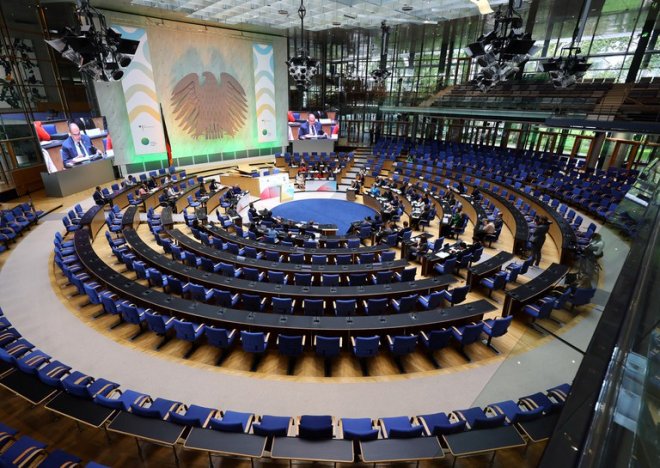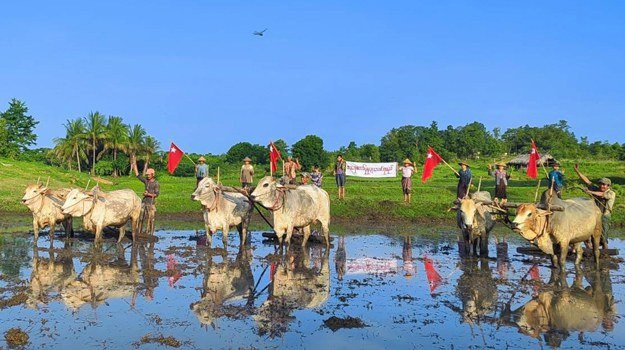Vietnamese citizen journalist sentenced to jail for advocating for land petitioners
A Vietnamese court sentenced citizen journalist Le Manh Ha to eight years in prison and five years of probation on the charge of “disseminating anti-state materials” for his advocacy on behalf of citizens who lost land to a major hydropower project, his attorney and wife said.Le Manh Ha, 52, has been active as a land petitioner since the early 2000s, campaigning against the relocation of farmers in Tuyen Quang province who were displaced by a hydroelectric project.
In May 2018, he founded a YouTube Channel called “The Voice of the People – Le Ha Television” to let land petitioners and farmers speak out against the injustices they faced. Ha also interviewed many land rights petitioners across the province.
“In Vietnam, corruption defeats the people because corruption has been equipped with modern weapons,” Ha wrote on Facebook the week before authorities arrested him in mid-January. “The people have no weapon except for their cell phones to fight against corruption.”
After his arrest, the province’s newspaper and the local police newspaper said Ha had prepared, posted and shared on YouTube, Facebook and other social media platforms, many articles and video clips with content that propagandized, distorted and defamed the state and spread fabricated information to sow confusion among the people.
The Tuyen Quang Provincial People’s Court held Ha’s one-and-a-half-day trial after two postponements in September, charging Ha under Article 117 of Vietnam’s 2015 Penal Code.
The article broadly prohibits distributing propaganda against the Socialist Republic of Vietnam, and is frequently used by authorities to stifle peaceful critics of the country’s one-party communist government. Those convicted of crimes charged under Article 117 can be sentenced to five to 20 years in jail.
Displaced by power plant
Ha and his family were forcibly displaced. They used to reside in the province’s Na Hang district, but they had to relocate to Tuyen Quang city in 2004 because of the construction of a hydropower plant.
His family and hundreds of other households said they were unfairly compensated for land lost to the project. They sent petitions to various provincial and central government officials, but their complaints have not been resolved.
Though all land in Vietnam is owned by the state, land confiscations have become a flashpoint with residents, who have accused the government of pushing small landholders aside in favor of major infrastructure projects and lucrative real estate developments and of paying insufficient compensation for their losses.
Since January, Vietnamese authorities have convicted six activists and Facebookers on the charge of “disseminating anti-state materials,” handing down prison sentences ranging from five to eight years. To date, the country has 49 prisoners of conscience jailed on this charge, while a dozen others have been detained for investigation.
Four lawyers defended Ha, who pleaded not guilty at the trial.
Court authorities allowed Ha’s wife, Ma Thi Tho, to attend the trial as a person with related interests and permitted Ha’s supporters and other relatives to watch the proceedings from a nearby room.
Exercising freedom of speech
Ha’s defense team believed that the verdict was wrong, one of the lawyers told RFA on condition of anonymity for safety reasons.
“The lawyers presented a lot of evidence to prove that Mr. Le Manh Ha had not violated Article 117,” the attorney said. “The trial developments, from the questioning to debating sessions, did not reflect the nature of the incident.”
The prosecutor did not respond to many arguments thoroughly, and the verdict summarized the defense lawyers’ viewpoints too briefly, he said.
Ha’s wife, Ma Thi Mo, told RFA that when the judge allowed Ha to say some final words at the trial, he stressed that what he had done was exercise freedom of speech.
Though Vietnam’s constitution guarantees that citizens “shall enjoy the right to freedom of opinion and speech,” those critical of the government or those who discuss certain topics deemed unacceptable by the Communist Party of Vietnam are often subject to intimidation and imprisonment.
“He said that all of his actions showed his patriotism and reflected his own opinions and that he did not intend to oppose the state or to defame the people’s government,” Mo said about her husband.
She also said Ha requested that the government remove Article 117 from the Penal Code and Article 16 from the Law on Cybersecurity.
Ha requested an appeal right after the judge announced the verdict.
UN Human Rights Council
Earlier this month, Vietnam was elected to a three-year term to the U.N. Human Rights Council beginning in 2023, despite calls by human rights groups that the country should be excluded because of its dismal human rights record.
Before the court issued the sentence, Phil Robertson, deputy Asia director for Human Rights Watch, called on the Vietnamese government to allow people like Ha to express their opinions peacefully in order to become a responsible member of the council.
“If Vietnam is serious about being a productive, contributing member of the UN Human Rights Council to which it was recently elected, the government should release all people locked up for simply expressing opinions the government doesn’t like,” Robertson said.
Translated by Anna Vu for RFA Vietnamese. Written in English by Roseanne Gerin.
[圖擷取自網路,如有疑問請私訊]
|
本篇 |
不想錯過? 請追蹤FB專頁! |
| 喜歡這篇嗎?快分享吧! |
相關文章
AsianNewsCast






















